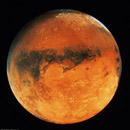Organic Matter Found on Mars, NASA Reveals in Major Announcement
The Independent
Wed June 6, 2018
Nasa's Curiosity rover has found organic matter preserved on Mars, in a discovery that could suggest it was once home to life.
The molecules represent an intriguing suggestion that Mars has been far more alive than we ever knew. While the discovery does not shed light on whether Mars was once home to alien life, and whether it could still be, the findings could be the result of ancient life there.
"The chances of being able to find signs of ancient life with future missions, if life ever was present, just went up," said Curiosity's project scientist, Ashwin Vasavada of NASA's Jet Propulsion Laboratory in Pasadena, California.
Experts say that the findings should propel us to look for conclusive evidence of alien life living on the planet.
"With these new findings, Mars is telling us to stay the course and keep searching for evidence of life," said Thomas Zurbuchen, associate administrator for the Science Mission Directorate at NASA Headquarters, in Washington. "I'm confident that our ongoing and planned missions will unlock even more breathtaking discoveries on the Red Planet."
The new announcement is actually the result of two new studies reveal vast new detail about how methane exists on the planet, as well as the unexpected organic molecules that are preserved in its soil.
And one team has made a significant breakthrough in our attempt to understand the ancient organic matter on Mars, which could help us understand whether the world was once habitable and what happened to it in the billions of years since.
The surface of Mars inhospitable today. But in the past, it almost certainly had liquid water, which could have helped fuel life there.
The Curiosity rover has headed to an area that was thought to once have been a large lake of that water, inside Gale Crater. It was inside that hole that scientists found the new findings, which suggest that water lake had all the necessary ingredients for life - from the chemical building blocks needed to the energy sources required to keep it alive.
The two studies appear in the journal Science. In a companion article, an outside expert describes the findings as "breakthroughs in astrobiology."
"The question of whether life might have originated or existed on Mars is a lot more opportune now that we know that organic molecules were present on its surface at the time," wrote Utrecht University astrobiologist Inge Loes ten Kate of the Netherlands.
Kirsten Siebach, a Rice University geologist who also was not involved in the studies, is equally excited. She said the discoveries break down some of the strongest arguments put forward by life-on-Mars skeptics, herself included.
"The big takeaway is that we can find evidence. We can find organic matter preserved in mudstones that are more than 3 billion years old," Siebach said. "And we see releases of gas today that could be related to life in the subsurface or at the very least are probably related to warm water or environments where Earth life would be happy living."
The methane observations provide "one of the most compelling" cases for present-day life, she said.
Scientists have long been baffled by the discovery of significant amounts of methane on Mars. On Earth, most methane is produced by biological sources, leading to hopes that it could suggest the Red Planet is more alive than we'd thought.
The new data suggests that the methane is being stored underneath the surface of the planet. Seasonal changes appear to bring that methane out and onto the surface, where it has been detected by Curiosity, they suggest.
Another piece of research published simultaneously shows that intriguing organic molecules have been found in ancient rock on Mars. Curiosity took new samples and heated them so that it could analyse the molecules that were released - and the data showed that there is certain matter that is similar to the kind of organic-rich rock found on Earth.





 Share your thoughts in the Forum
Share your thoughts in the Forum
